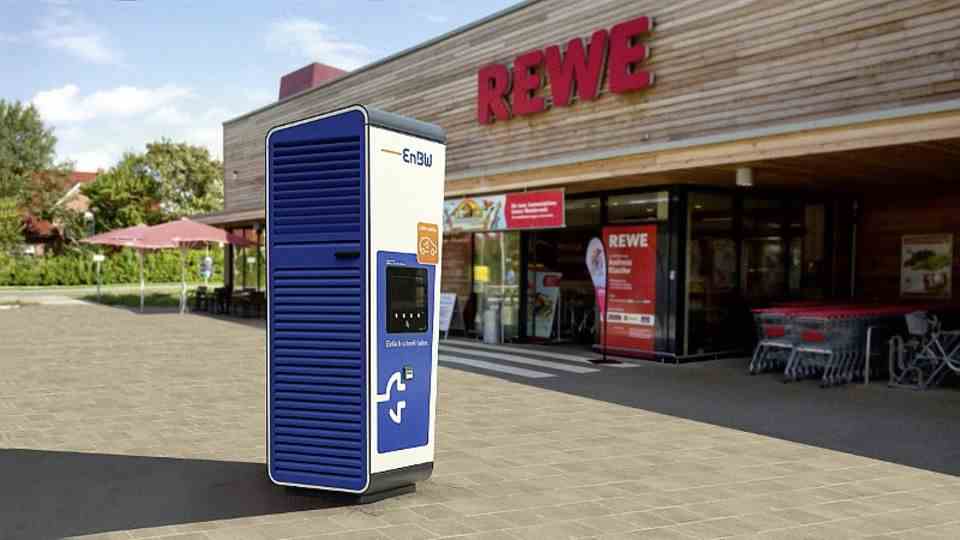Charging columns as a competitive advantage
Full throttle on the coffee highway
Rewe EnBW
© press-inform – the press office
In the medium term, fewer and fewer drivers will be driving to a gas station, instead charging their own electric car at a charging station. Since the charging time is often an annoying waiting time, charging stations in front of supermarkets, shopping centers, coffee shops and restaurants are ideal. Here, the waiting time hardly bothers anyone – on the contrary.
The idea is not entirely new, but in the USA in particular the announcement that the popular coffee house chain Starbucks will be equipping some of its stores with fast charging stations in the future not only put coffee connoisseurs and Tesla fans in a good mood for the weekend. The cooperation between Starbucks, Volvo and the charging network provider Chargepoint initially applies to the US market. Starting this summer, 60 quick-charging stations are to be built at 15 coffee shops along a 2,000-kilometer route from Denver to Starbucks’ hometown of Seattle. You can then stop at Starbucks every 150 kilometers, enjoy your choice of hot or cold drink and recharge at the same time. Fast-charging stations should ensure that an electric car with a stopover of around half an hour is recharged for the next 250 to 300 kilometers while the travelers take a short snack break.
While users of an electric car can refuel here for a fee, Volvo drivers can do so either free of charge or at least at a reduced price. “Volvo Cars wants to give people the freedom to move around while making less of an impact on the environment,” says Anders Gustafsson, President and CEO of Volvo Car USA. “Working with Starbucks, we can achieve this by providing them with comfortable places to relax bid while their cars charge.” But that’s not all, because after the 2,000-kilometer test route, further coffee highways are to be built in the USA. “We are very excited to partner with Volvo Cars to test how we can charge our customers’ electric vehicles at Starbucks locations,” said Michael Kobori, Chief Sustainability Officer at Starbucks. “Imagine a future where Starbucks helps our customers to connect sustainably.” At the same time, Starbucks wants to electrify an increasing number of its coffee houses with solar energy. By the end of the year there should be 55 branches.
In the medium term, charging stations at supermarkets and hardware stores, coffee shops and shopping centers are likely to become an important competitive advantage and a customer loyalty tool. Because if you can recharge your electric car while shopping or having a relaxing dinner without any additional effort, you will probably come back and spend a few euros more than you originally planned in the supermarket or restaurant because you are staying longer. Finally, a look at the app on your own smartphone shows that it still has to be loaded for 20 more minutes. There is still a cappuccino or a T-shirt more and everyone involved is satisfied.
However, one does not have to travel to the USA for such a service. In Europe and especially in Germany, there are more and more chains that increase the value of the stay with charging options – often even free of charge. The supermarket chain Kaufland offers electric charging stations at many of its larger stores. In the next few months, the number of electrical sites is expected to increase from the current 100 to 120. Best of all: the green electricity is free. Disadvantage: you can stand in the electric car park for a maximum of 60 minutes. A long, bulky purchase for the weekend can be difficult. At Kaufland, as with most providers, the common plug types (Type 2/ CCS and CHAdeMO) are available. However, the speed is currently still manageable, because the maximum charging capacity is a narrow 50 kilowatts.
The situation is very similar with the supermarket chain Rewe. Together with the network operator EnBW, the first 100 fast charging locations are to be created by the end of the year – with a maximum of up to 300 kW. “The partnership with Rewe brings us another giant step forward in the Germany-wide expansion of our fast charging network,” says Timo Sillober, Operations Officer at EnBW, “I drive to the supermarket parking lot, connect my car to the fast charger. After about 20 to 30 minutes – that’s how long it takes a shopping trip usually takes – I can get back to my charged vehicle.”
McDonalds, the best-known fast food chain in the world, also wants to equip more and more of its burger roasteries with fast charging stations in the coming years. Together with EWE, more and more McDonalds locations should also become interesting for drivers of electric vehicles. The quick-charging station in Wolfsburg, Lerchenweg 24, is one of around 1,000 nationwide charging stations that are to be installed in Germany by 2025. There are currently almost 50 McDonald’s restaurants between Flensburg and Garmisch with EWE Go charging stations, which can charge cars with up to 150 increase kilowatts. “We are a communication platform between individual car companies and customers and are therefore always up to date. This also applies to electromobility,” emphasizes operator Dennis Lampe, “our city of Wolfsburg wants to become a model and reference city for electromobility by 2025 with its electromobility strategy .”


